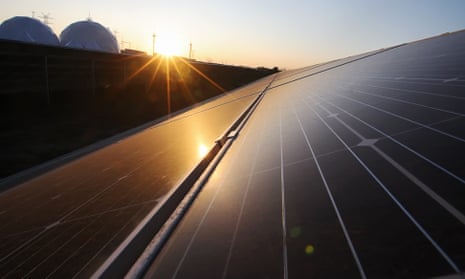Investment in greenhouse gas emission reduction fell last year despite the growing urgency of the climate crisis, and the benefits of outlays were cancelled out by investments globally in fossil fuels and other dirty industries, finds a report by the Climate Policy Initiative.
Global climate finance hit a record high of $612bn (£476bn) in 2017, according to CPI advisers, but fell back 11% after that bumper year to $546bn in 2018.
Less public money for low-carbon transport and lower private-sector investment in renewable energy were the causes of the drop. However, the average investment for 2017 and 2018 was 25% higher than for the period 2015 and 2016.
“Given the urgency of the climate challenge it is a positive sign that we have passed the half trillion dollar mark of investment towards climate change activities,” said Barbara Buchner, executive director of climate finance at CPI, which published its assessment on Thursday.
The study, entitled Global Landscape of Climate Finance 2019, found that investment at least more than three times as high as current levels would be needed annually until 2050 to clean up the world’s energy generation systems.
On top of that, adapting to the impacts of climate breakdown is likely to cost more than $180bn a year from 2020. However, only $30bn a year was spent in the last two years, an increase of about a third on 2015 and 2016 levels.
Buchner said: “[Current investment] is simply not enough, especially as investments in polluting industries continue to effectively cancel out these efforts to address climate change. Leaders should be focused on total economic transformation.”
On the plus side, the analysts said, money spent on renewable energy and low-carbon transport now went much further in cutting emissions, as the costs of such technology had dropped rapidly.
Investment in cutting emissions in developing countries was $356bn in 2017-18, compared with $270bn for the previous two-year period. More than half of climate finance globally comes from the private sector.
Climate finance is one of the key pillars of international climate-change negotiations, and the role of rich countries in assisting poor countries with investment will be a vexed topic of discussion at the COP25 UN climate talks in December, which are in Madrid following civil unrest in Chile.
Buchner said: “There are some bright spots, but our study is very clear – governments, development finance institutions and investors need to make a major shift in how they invest if they want to avoid climate change.”
